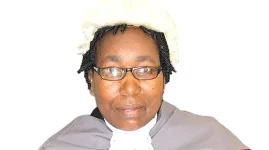Zimbabwe's top constitutional court has backed President Mnangagwa's decision to fire former High Court judge Erica Ndewere. The court unanimously ruled that the president acted within his legal rights when removing her from the judicial bench on June 17, 2021.
Ndewere challenged her dismissal through prominent human rights lawyer Beatrice Mtetwa, arguing the removal process violated her constitutional rights. She claimed the disciplinary tribunal overstepped its authority and failed to follow proper legal procedures.
The seven-member Constitutional Court panel thoroughly examined her arguments and found no merit in her case. Justice Paddington Garwe delivered the unanimous ruling, emphasizing that Mnangagwa followed constitutional guidelines under section 187 when implementing the tribunal's recommendation.
NdeWere alleged discrimination, suggesting she was treated differently from other judges facing disciplinary proceedings. She also challenged the investigative process, claiming Chief Justice Luke Malaba did not properly appoint a three-judge panel as required by judicial ethics codes.
The court rejected her arguments, stating that the president's role involves implementing tribunal recommendations without questioning their validity. The judges noted Ndewere's application lacked precise legal specifics and failed to establish a valid challenge to presidential actions.
Interestingly, despite making serious accusations against the Chief Justice, Judicial Service Commission, and disciplinary tribunal, Ndewere did not include these entities as respondents in her legal challenge. The court viewed this omission as a significant weakness in her case.
The Constitutional Court ultimately dismissed Ndewere's application for reinstatement, back pay, and benefits. No costs were awarded, reflecting the nuanced nature of the judicial review process.
Ndewere challenged her dismissal through prominent human rights lawyer Beatrice Mtetwa, arguing the removal process violated her constitutional rights. She claimed the disciplinary tribunal overstepped its authority and failed to follow proper legal procedures.
The seven-member Constitutional Court panel thoroughly examined her arguments and found no merit in her case. Justice Paddington Garwe delivered the unanimous ruling, emphasizing that Mnangagwa followed constitutional guidelines under section 187 when implementing the tribunal's recommendation.
NdeWere alleged discrimination, suggesting she was treated differently from other judges facing disciplinary proceedings. She also challenged the investigative process, claiming Chief Justice Luke Malaba did not properly appoint a three-judge panel as required by judicial ethics codes.
The court rejected her arguments, stating that the president's role involves implementing tribunal recommendations without questioning their validity. The judges noted Ndewere's application lacked precise legal specifics and failed to establish a valid challenge to presidential actions.
Interestingly, despite making serious accusations against the Chief Justice, Judicial Service Commission, and disciplinary tribunal, Ndewere did not include these entities as respondents in her legal challenge. The court viewed this omission as a significant weakness in her case.
The Constitutional Court ultimately dismissed Ndewere's application for reinstatement, back pay, and benefits. No costs were awarded, reflecting the nuanced nature of the judicial review process.












